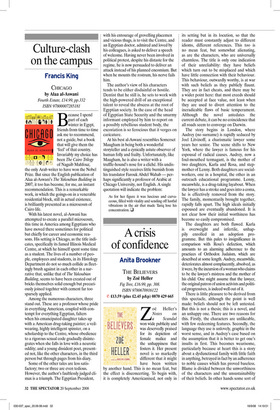B ecause I spend part of each winter in Egypt, friends
from time to time ask me to recommend, not a guide, but a book that will give them the ‘feel’ of that country. Invariably my choice has been The Cairo Trilogy of Naguib Mahfouz, the only Arab writer to have won the Nobel Prize. But since the English publication of Alaa al-Aswani’s The Yakoubian Building in 2007, it too has become, for me, an instant recommendation. This is a remarkable work, in which the goings-on in a venerable residential block, still in actual existence, is brilliantly presented as a microcosm of Cairo life.
With his latest novel, al-Aswani has attempted to create a parallel microcosm, this time in America among Egyptians who have moved there sometimes for political but chiefly for career and economic reasons. His setting is Chicago, as the title indicates, specifically its famed Illinois Medical Centre, at which he himself spent some time as a student. The lives of a number of people, employees and students, in its Histology Department do not so much collide as fleetingly brush against in each other in a narrative that, unlike that of The Yakoubian Building, seems to have been created out of bricks themselves solid enough but precariously joined togehter with cement far too sparsely applied.
Among the numerous characters, three stand out. These are a professor whose pride in everything American, coupled with contempt for everything Egyptian, falters when his emancipated daughter takes up with a American drug-taking painter; a veilwearing, highly intelligent spinster, on a scholarship to the Centre, whose obedience to a rigorous sexual code gradually disintegrates when she falls in love with a neurotic oddity; and a young dissident poet, presented not, like the other characters, in the third person but through pages from his diary.
Some of the other tales are less satisfactory; two or three are even tedious. However, the author’s faultlessly judged climax is a triumph. The Egyptian President, with his entourage of grovelling placemen and vicious thugs, is to visit the Centre, and an Egyptian doctor, admired and loved by his colleagues, is asked to deliver a speech of welcome. Having never been involved in political protest, despite his distaste for the regime, he is now persuaded to deliver an attack instead of his planned encomium. But when he mounts the rostrum, his nerve fails him.
The author’s view of his characters tends to be either disdainful or hostile. Dentist that he still is, he sets to work with the high-powered drill of an exceptional talent to reveal the abscess at the root of Egyptian society. In the case of the head of Egyptian State Security and the smarmy informant employed by him to report on a possibly rebellious student body, the excoriation is so ferocious that it verges on caricature.
At his best al-Aswani resembles Somerset Maugham in being both a wonderful storyteller and a cynically astute observer of human folly and frailty. Unfortunately, like Maugham, he is also a writer with a truffle-hound’s nose for a cliché. His undistinguished style receives little burnish from his translator Farouk Abdel Wahab — perhaps significantly a professor of Arabic at Chicago University, not English. A single quotation will indicate the problem: As for her figure it was luscious and curvaceous, filled with vitality and sending off lustful vibrations in the air that made Tariq lose his concentration. q










































































 Previous page
Previous page